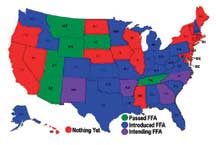The Tenth Amendment to the Constitution of the United States is part of the Bill of Rights as ratified on December 15, 1791. The amendment is entitled “Reserved Powers” and serves as the clarification of the intent of the founding fathers regarding the restrictions placed upon the
[United States] federal government:
The powers not delegated to the United States by the Constitution, nor prohibited by it to the States, are reserved to the States respectively, or to the people.
On June 8, 1789, James Madison introduced a series of proposals in the House of Representatives that would eventually become the Bill of Rights. They were created out of necessity to gain ratification of the proposed Constitution from all existing states. The resulting Tenth Amendment established the condition that the powers of the federal government come from a “delegation” of power, not a “surrender” of power.
It is this very struggle for control that has sparked the greatest revival of interest in the Tenth Amendment as the ground swell moves from state to state across the whole of the United States.
The Debate
America has experienced two decades of palpable federal power grabbing. The established balance of power between the Executive, Legislative, and Judicial branches has been virtually discarded as the Supreme Court nullifies legislative actions with court decisions; Executive Orders put administrative functions into place that would not pass the House or Senate; and the House and Senate are passing legislation no one is reading.
However, it is the massive thrust to socialize all American institutions that have state governments and American citizens screaming “Tenth Amendment” and “State Nullification.” Additional references to the growing movement include the “Freedom Movement” and “State Sovereignty.” The resulting debate rages, on both sides, with arguably the same passions that created the need for the Tenth Amendment clarification in the first place.
In fact, the proponents of revisiting the original intent of the Tenth Amendment are now referred to as “Tenthers.” What was meant as a slur in the mainstream media is now a badge of honor for a bitter public; a public that is coming together with a symphony of causes.
The issues currently creating the most attention at the state level include the federal mandates for nationalized health care, cap and trade, card check, medical marijuana use, and federal firearms registration. As each week progresses, new concerns and causes come to the surface.
The Commerce Connection
When observed from a Biblical worldview, the use of the “interstate commerce” argument for control of all aspects of life in America is intriguing.
Essentially, the power to regulate interstate commerce was originally granted to the Congress so it would keep commerce between the States regular, by eliminating state tariffs. As enumerated in Article 1, Section 8, Clause 3 of the Constitution, the Congress shall have power “To regulate Commerce with foreign Nations, and among the several States, and with the Indian Tribes.”
As evidenced in recent years, the Congress now feels it has the right to regulate every aspect of your life because every activity requires an economic component; and every economic component must fall under the Commerce Clause of the Constitution.
The same argument for economic controls to dominate the population and eliminate dissenters will also be instituted one day by the administration of the final world leader. Consider the lesson of Revelation 13:16,17:
And he causeth all, both small and great, rich and poor, free and bond, to receive a mark in their right hand, or in their foreheads: and that no man might buy or sell, save he that had the mark, or the name of the beast, or the number of his name.
The lessons of tyranny have not changed throughout time—nor will they change. America’s Founding Fathers codified measures to keep tyranny at bay. However, as time marches on, the fight to maintain the purity of their work has only just begun.
State Nullification
 Several states are drafting legislation in direct opposition to federal mandates. One of particular popularity is the FFA, Firearms Freedom Act. State legislatures are passing versions of the Firearms Freedom Act to directly challenge the federal contention that it has the authority to regulate firearms under the interstate commerce clause. The states have declared that any firearms made and retained in-state are beyond the authority of Congress.
Several states are drafting legislation in direct opposition to federal mandates. One of particular popularity is the FFA, Firearms Freedom Act. State legislatures are passing versions of the Firearms Freedom Act to directly challenge the federal contention that it has the authority to regulate firearms under the interstate commerce clause. The states have declared that any firearms made and retained in-state are beyond the authority of Congress.
This map provided by WorldNetDaily indicates the status of the FFA legislation.
Interestingly, the U.S. Bureau of Alcohol, Tobacco, Firearms, and Explosives (BATFE) informed all licensed arms dealers via an open letter that such legislation is unconstitutional under the supremacy clause. Government lawyers for the U.S. Department of Justice filed a brief in federal court against the FFA.
Clint Bolick, a lawyer at the Goldwater Institute in the state of Arizona, instigated a move to amend state constitutions to nullify federal health care legislation. Bolick made his point clear when he wrote:
The measures are an opportunity for people to make their views known in a tangible way, to generate some rumble at the grass roots… Our system of federalism was designed to ensure that the federal government acts only within the boundaries of its defined powers and that states may give broader protection to individual liberty than does the federal Constitution. The system can endure only if its principles are applied consistently.
The state “nullification” legislations intend to send a strong message to the federal government. It is a message, however, that the federal government is not willing to hear. The next question: how will the federal government retaliate if states ignore federal laws?
Federal Repercussions
Precedent exists that reveals the most likely scenario the federal government will use against disobedient states—the power of money. In 1984, the federal government needed the states to accept the National Minimum Drinking Age Act to raise the age for the purchase and public consumption of alcohol to 21. All states were not in agreement with the Act and were slow to comply. The states were told to comply by October 1986 or lose 10 percent of their federal highway funds. All states complied.
Considering the current budget shortfalls in states such as California and Arizona, the federal government could easily threaten to bankrupt the states to silence the opposition. To avoid a confrontation in the early stages of the movement, one analyst suggests the key to successfully using nullification is to expose the federal government as the aggressive, unconstitutional usurper without the state directly becoming the aggressor.
The future of the movement looks promising because it currently spans partisan politics. The possibility to spark debate not only regarding the proper separation of power between state and federal governments, but who decides when the federal government oversteps its proper authority; and how to rein in the federal government when it does overstep.
As more states become involved in the nullification process, the federal government may find themselves facing a genuine uprising of noncompliant states. The Feds will play the money card. It will cost the states and the citizens to push back at this stage of the game. The question: does the American citizen have the stomach for the fight?
The Catalyst of Change
The current “freedom movement” is not just about writing your Congressman or voting for a particular party. Many leaders within the movement are focusing the attention of the people back to their state and local governments recognizing that their state government can block and roll back the destructive force of the federal onslaught.
One movement leader suggested the circumstances of American politics seem ripe for the revived message of limited government, separation of powers, checks and balances, and meeting power with power; or simply put, drawing lines in the sand for freedom’s sake. The coming months will tell the story.
Mourning the Loss
There is a five-step process that one goes through when they mourn or grieve a loss. Americans have been feeling the loss of freedom for many years. Stage 1 in the grieving process is denial and isolation. It would not be a stretch to say that most Americans have been in a state of denial as their freedoms have slipped through their fingers over the years. Stage 2 in the grieving process is anger. This is definitely the identity phase of those who would call themselves “Tenthers.”
For the American citizen, as well as for those who benefit from America’s freedoms around the globe, let us pray that the intent of the Tenth Amendment is resurrected before the remaining three stages of grieving are encountered: bargaining, depression, and acceptance. May this not be America’s legacy of grief.
When the righteous are in authority, the people rejoice: but when the wicked beareth rule, the people mourn.
Proverbs 29:2
Notes:
http://www.thenewamerican.com/index.php/usnews/constitution/2957-state-vs-federal-the-nullification-movement
http://www.worldnetdaily.com
http://tenthamendmentcenter.com/






